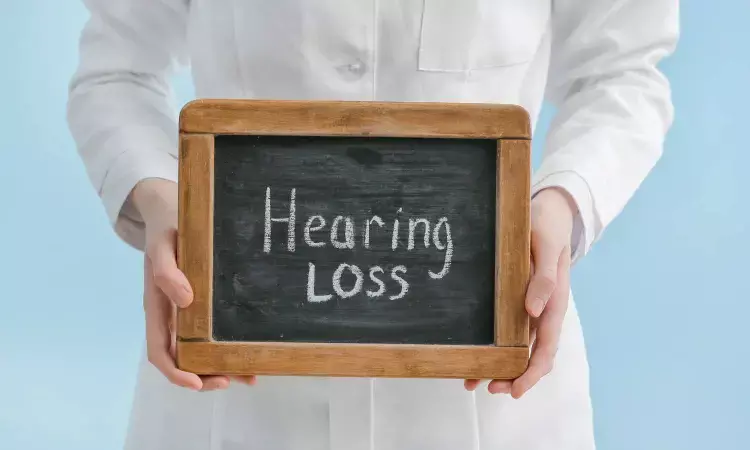- Home
- Medical news & Guidelines
- Anesthesiology
- Cardiology and CTVS
- Critical Care
- Dentistry
- Dermatology
- Diabetes and Endocrinology
- ENT
- Gastroenterology
- Medicine
- Nephrology
- Neurology
- Obstretics-Gynaecology
- Oncology
- Ophthalmology
- Orthopaedics
- Pediatrics-Neonatology
- Psychiatry
- Pulmonology
- Radiology
- Surgery
- Urology
- Laboratory Medicine
- Diet
- Nursing
- Paramedical
- Physiotherapy
- Health news
- Fact Check
- Bone Health Fact Check
- Brain Health Fact Check
- Cancer Related Fact Check
- Child Care Fact Check
- Dental and oral health fact check
- Diabetes and metabolic health fact check
- Diet and Nutrition Fact Check
- Eye and ENT Care Fact Check
- Fitness fact check
- Gut health fact check
- Heart health fact check
- Kidney health fact check
- Medical education fact check
- Men's health fact check
- Respiratory fact check
- Skin and hair care fact check
- Vaccine and Immunization fact check
- Women's health fact check
- AYUSH
- State News
- Andaman and Nicobar Islands
- Andhra Pradesh
- Arunachal Pradesh
- Assam
- Bihar
- Chandigarh
- Chattisgarh
- Dadra and Nagar Haveli
- Daman and Diu
- Delhi
- Goa
- Gujarat
- Haryana
- Himachal Pradesh
- Jammu & Kashmir
- Jharkhand
- Karnataka
- Kerala
- Ladakh
- Lakshadweep
- Madhya Pradesh
- Maharashtra
- Manipur
- Meghalaya
- Mizoram
- Nagaland
- Odisha
- Puducherry
- Punjab
- Rajasthan
- Sikkim
- Tamil Nadu
- Telangana
- Tripura
- Uttar Pradesh
- Uttrakhand
- West Bengal
- Medical Education
- Industry
Can hearing loss be reversed? Research reveals clues that could regrow the cells that help us hear

Taking a bite of an apple is considered a healthy choice. But have you ever thought about putting in earplugs before your favorite band takes the stage?
Just like your future body will thank you for the apple, your future ears (specifically your cochlear hair cells) will thank you for protecting them. The most common cause of hearing loss is progressive because these hair cells-the primary cells to detect sound waves-cannot regenerate if damaged or lost. People who have repeated exposure to loud noises, like military personnel, construction workers, and musicians, are most at risk for this type of hearing loss. But, it can happen to anyone over time (even concert goers).
On the other hand, birds and fish can regenerate these hair cells, and now researchers at the Del Monte Institute for Neuroscience are getting closer to identifying the mechanisms that may promote this type of regeneration in mammals, as explained in research recently published in Frontiers in Cellular Neuroscience.
“We know from our previous work that expression of an active growth gene, called ERBB2, was able to activate the growth of new hair cells (in mammals), but we didn’t fully understand why,” said Patricia White, PhD, professor of Neuroscience and Otolaryngology at the University of Rochester Medical Center. The 2018 study led by Jingyuan Zhang, PhD, a postdoctoral fellow in the White lab at the time, found that activating the growth gene ERBB2 pathway triggered a cascading series of cellular events by which cochlear support cells began to multiply and activate other neighboring stem cells to become new sensory hair cells.
“This new study tells us how that activation is happening-a significant advance toward the ultimate goal of generating new cochlear hair cells in mammals,” said White.
Using single-cell RNA sequencing in mice, researchers compared cells with an overactive growth gene (ERBB2 signaling) with similar cells that lacked such signaling. They found the growth gene-ERBB2-promoted stem cell-like development by initiating the expression of multiple proteins-including SPP1, a protein that signals through the CD44 receptor. The CD44 receptor is known to be present in cochlear-supporting cells. This increase in cellular response promoted mitosis in the supporting cells, a key event for regeneration.
“When we checked this process in adult mice, we were able to show that ERBB2 expression drove the protein expression of SPP1 that is necessary to activate CD44 and grow new hair cells,” said Dorota Piekna-Przybylska, PhD, a staff scientist in the White Lab and first author of the study. “This discovery has made it clear that regeneration is not only restricted to the early stages of development. We believe we can use these findings to drive regeneration in adults.”
“We plan to further investigation of this phenomenon from a mechanistic perspective to determine whether it can improve auditory function after damage in mammals. That is the ultimate goal,” said White.
Reference:
Dorota Piekna-Przybylska, Daxiang Na, Jingyuan Zhang, Cameron Baker, John M. Ashton, Patricia M. White. Single cell RNA sequencing analysis of mouse cochlear supporting cell transcriptomes with activated ERBB2 receptor indicates a cell-specific response that promotes CD44 activation. Frontiers in Cellular Neuroscience, 2023; 16 DOI: 10.3389/fncel.2022.1096872
Dr Kamal Kant Kohli-MBBS, DTCD- a chest specialist with more than 30 years of practice and a flair for writing clinical articles, Dr Kamal Kant Kohli joined Medical Dialogues as a Chief Editor of Medical News. Besides writing articles, as an editor, he proofreads and verifies all the medical content published on Medical Dialogues including those coming from journals, studies,medical conferences,guidelines etc. Email: drkohli@medicaldialogues.in. Contact no. 011-43720751


